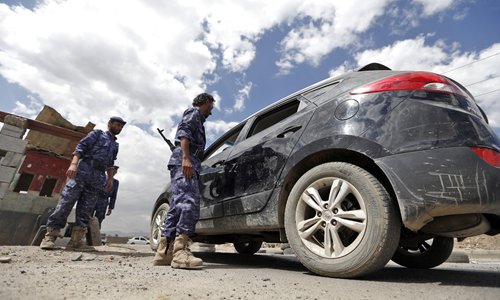Yemen’s Huthi insurgents claim responsibility for cross-border strikes
Top crude exporter Saudi Arabia announced a “temporary reduction” in oil output at a facility run by energy giant Aramco on Sunday, after Yemen’s Huthi rebels launched multiple cross-border attacks.
A drone assault on the YASREF refinery, in the Yanbu Industrial City on the Red Sea, has “led to a temporary reduction in the refinery’s production, which will be compensated for from the inventory,” the energy ministry said, adding that there were no casualties.
The statement cited a ministry official as saying two drone attacks at around 5:30 am (0230 GMT) were launched at Yanbu’s gas plant and another on YASREF, which produces 400,000 barrels per day (bpd), according to its website.
The official condemned the attacks, saying they followed a Saturday “drone assault” on a petroleum products distribution terminal in Jizan in the south of the country.
The Huthis, against whom Saudi Arabia leads a military coalition in Yemen, have repeatedly targeted the kingdom, including Aramco’s sites.
The insurgents said on Sunday that they launched cross-border drone and missile attacks on the kingdom, targeting a number of “vital and important” establishments – including Aramco facilities.
The coalition, meanwhile, said it intercepted and destroyed ballistic missiles launched toward Jizan as well as nine armed drones targeting other areas in the kingdom.
“Initial investigations indicate the militia used Iranian cruise missiles that targeted Al-Shaqeeq desalination plant and Aramco’s Jizan bulk plant,” it said in a statement, adding other targets included a Dhahran Al-Janoub power station, a gas station in Khamis Mushait and an Aramco gas plant in Yanbu.
It said that the “hostile attacks” and scattered debris after interception caused “some material damage,” without specifying which sites were damaged.
In 2019, aerial assaults on two Aramco facilities in the eastern region temporarily knocked out half of the kingdom’s crude production, underscoring the vulnerability of its infrastructure.
The latest round of attacks comes after an oil refinery in the Saudi capital Riyadh was targeted on March 10 by a drone, an operation claimed by the Huthis.
The Huthis days ago rejected an invitation from the six-nation Gulf Cooperation Council to attend talks on the Yemen conflict, to be held in Riyadh between March 29 and April 7.
The Yemen war has cost hundreds of thousands of lives, directly or indirectly, and displaced millions, in what the UN has called the world’s worst humanitarian crisis.
Global oil markets are in a state of disarray over the impact of the Russia-Ukraine conflict and the effect it will have on energy supplies.
Yemeni soldiers loyal to the Iran-backed Shiite Huthi rebels stop a car at a security checkpoint, as the rebels tighten security measures in Sanaa on Tuesday ahead of a demonstration commemorating the third anniversary of their capture of the capital. Photo: AFP




